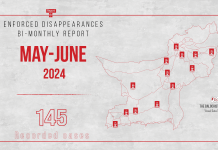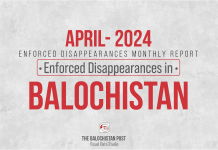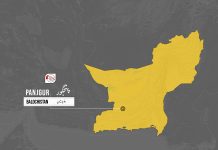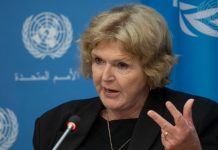Having seen that their 5-year long campaign has not borne any fruit, the Voice for Baloch Missing Persons resolved to carry out a march from Quetta to the federal capital, Islamabad, on foot. The aim of this march, according to the marchers, was not to attract the government’s attention, but bring Balochistan’s plight into the international spotlight. At this point, the campaigners had lost all the hopes of a peaceful solution by the Pakistani authorities. Instead, they sought the United Nations to intervene to resolve the problem of enforced disappearances in Balochistan.
On October 27, 2013, a core group of almost 60 marchers launched the 2500+ kilometre march to Islamabad. Headed by Mama Qadeer Baloch, Nasrullah Baloch and Farzana Majeed, the caravan intended to have a sojourn in Karachi and then continue their march towards the federal capital. Carrying tens of portraits, images and placards and documents meant to be submitted to the United Nations, the marchers parted from their family members and friends in Quetta and left for Karachi.
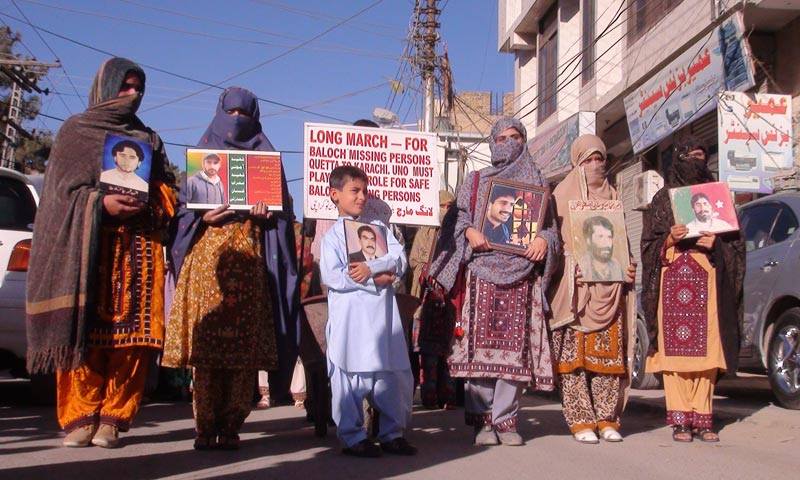
Weather was treacherous; the caravan was unarmed. Some of the trekkers fell ill; others couldn’t walk for such a long distance. Therefore, most of the protestors stopped in various cities along the way. In the end, only 16 people remained – four men, 3 children and 9 women. The marchers had avoided hauling food and water in large quantities as they could potentially impede their movement. Walking along the seemingly endless national highway, the marchers only had the bleak mountains to talk to.
The march was proceeding smoothly until the caravan reached Baghbana, where the local administration and alleged death squad members warned them to abandon the march and return to Quetta or otherwise be attacked by miscreants; Mama Qadeer refused to comply. Sensing the imminent threat the caravan cancelled their pre-planned stay in Baghbana and journeyed to Khuzdar in Night. In Wadh, the marchers received a warm welcome from Akhtar Mengal, the President of Balochistan National Party Mengal. Mengal provided his guards to the caravan that accompanied them till Hub.
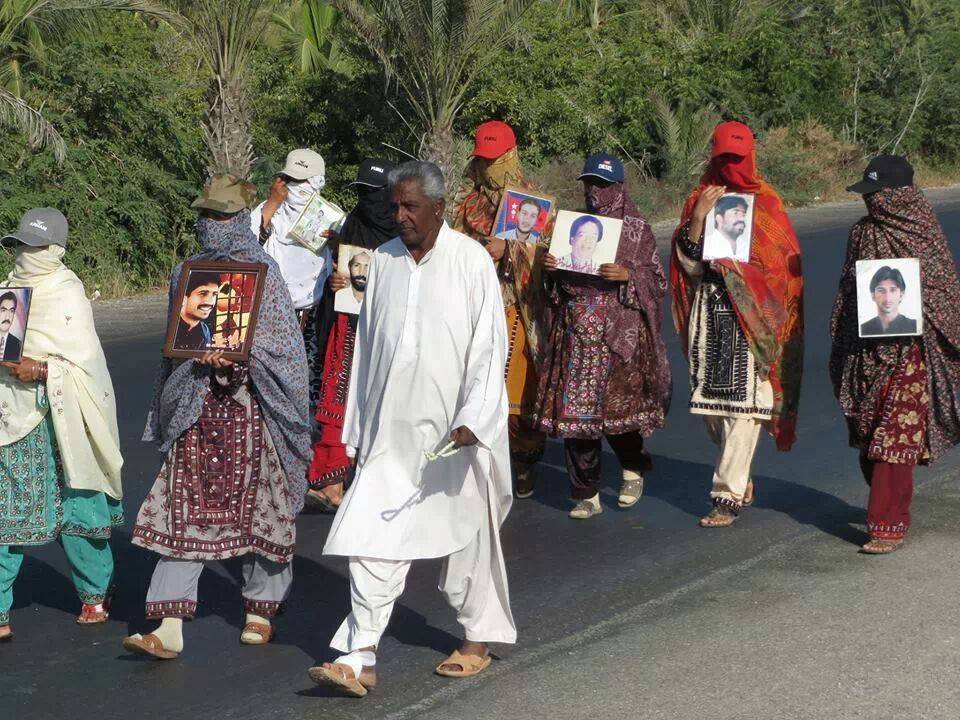
After almost a month, the caravan reached their first destination. In Hub and Karachi, the marchers received big receptions; activists and the public welcomed them alike. After a 750-kilometre tiresome walk, the VBMP organized a sit-in in front of the Karachi Press Club that lasted for weeks. In that period, Senator Hasil Bezinjo met and sympathized with the marches. He acknowledged that his party, National Party, and the incumbent Chief Minister of Balochistan, Dr Abdul Malik Baloch, were powerless in this regard. The then Defense Minister of Pakistan, Khuwaja Asif, met with the marchers and promised that the government will produce and trial the missing persons in the courts. Asif also told media that Mama Qadeer had refused to meet the then incumbent Prime Minister of Pakistan, Nawaz Sharif. When inquired about the refusal, Qadeer said that their mission was to seek a global audience, not to settle for some false promises. He also said that he was concerned about the security of his convoy.
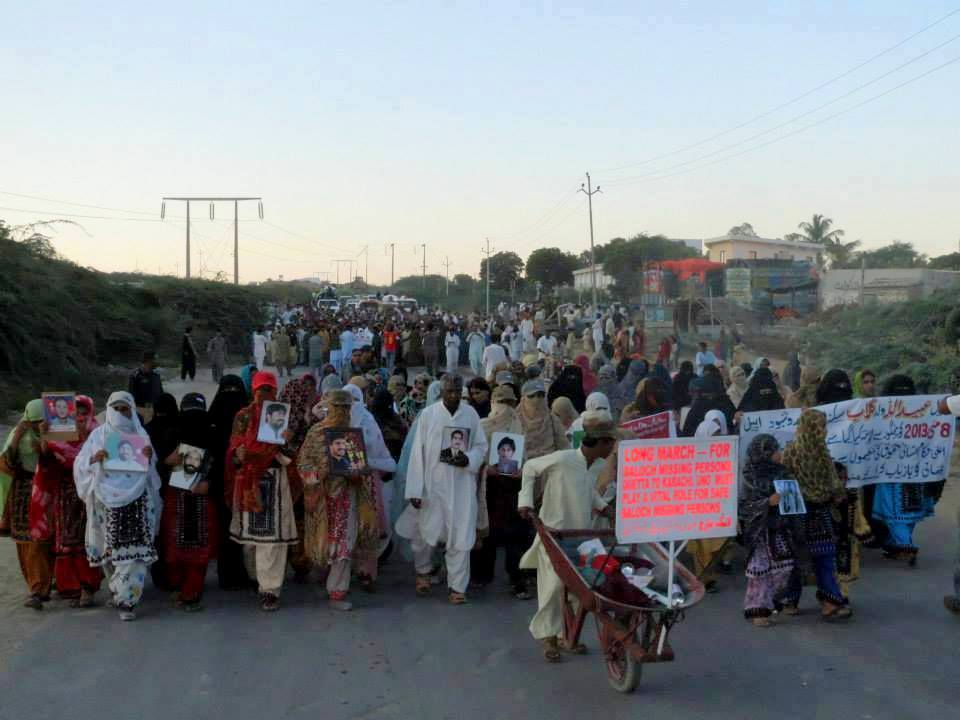
Sensing the government’s infidelity and their workaday, hollow promises, the small convoy decided to continue their march towards Islamabad in December 2013. During their journey through the internal Sindh, the marchers were joined by hundreds of admirers. Students, few Rights Organizations and journalists met with the marchers along the way. Some residents joined the caravan for a few kilometers, others journeyed to Islamabad with them. Mama Qadeer and others expressed gratitude to this kind of treatment from the Sindh and continued their journey.
Then came Punjab. As soon as the VBMP convoy set foot in the Punjab soil, they received various kinds of threats to abandon their enterprise and travel back home. In Punjab, the caravan was first stopped in Multan and then in Okara. In Multan, as the marchers were passing by military contentment, armed men in uniform threatened them at gunpoint to stop the march; the marchers refused. Despite warnings and threats, the Seraiki nationalists joined arms with the VBMP and organized a protest in front of Multan Press Club.
As the trekkers were near Renela Khurd, a truck tried to hit the convoy. Two participants, including a woman, were seriously injured, but the caravan didn’t stop. When the marchers reached the heart of Punjab – Lahore – few members of the Human Rights Commission of Pakistan, the Asian Human Rights Commission and Awami Workers Party welcomed the marchers. Out of 20 million people in Lahore, only a few came out to respond. “We are almost dead as a society. We need to stand with the oppressed and the marginalized”, a local activist had said. To sympathize with their Baloch brethren and to avoid the agencies’ gaze, the Baloch students wore masks to conceal their identity and participated in the march. “Our Baloch brethren are in need of our shoulders”, a student had said.
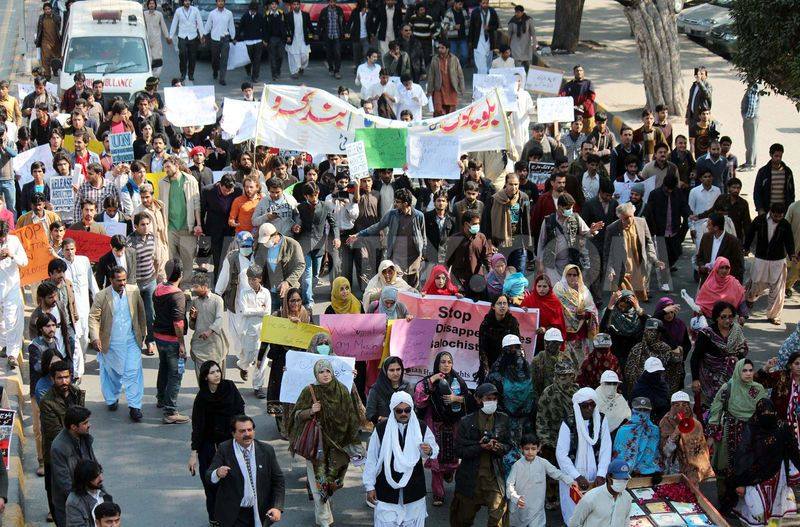
In Gujrat, the convoy once again received threats by the commandoes of the Punjab police to abandon their cause. When the marchers didn’t comply, they were not allowed to pass through Gujrat city; they were forced to take a detour and travel through the Gujrat bypass. Near Sarail Alamgir, the marchers were again threatened at gunpoint by a dozen strangers in the presence of Punjab police to halt their mission; the marchers refused. In Jhelum, the caravan was joined by the Pakistani Journalist, Hamid Mir. According to Mir, most Punjabi’s were confused about the old man from Balochistan travelling hundreds of kilometers to Islamabad by foot. Nevertheless, they offered food and water to the caravan.
During their transition through Punjab, the VBMP marchers were offered food, beverages and night stay, but the agency personnel accompanying the caravan in plainclothes had threatened the helpers. “We know that all the Punjabis are not bad but intelligence agencies never allowed them to even welcome us. It was against the culture of Punjab”, Qadeer had told Mir.
In the last days of February, the marchers reached Rawalpindi. At this point, the convoy had increased to its initial numbers – tens of people had joined the caravan along the way. Almost 60 people were determined to enter Islamabad and accompany the marchers until their mission is fulfilled. Hundreds of participants also accompanied the convoy to a few kilometers from the cities.
After a 4-month gruelling journey through Pakistan, the Voice for Baloch Missing Persons’ caravan reached Islamabad on March 1, 2014, on Friday. After a two-day rest, the marchers approached the UN embassy in Islamabad to submit their documents and enlist their demands on Monday. Mama Qadeer and Farzana Majeed submitted a four-page charter of demands, the list of missing persons and the enforced disappearances. According to Qadeer, the UN officials were astonished to know that almost 19,000 persons were missing from Balochistan. They had an hour and a half long meeting with the officials who, through an interpreter, assured them their demands will be sent first to General-Secretary’s office in New York and ultimately to High Commissioner for Human Rights in Geneva.
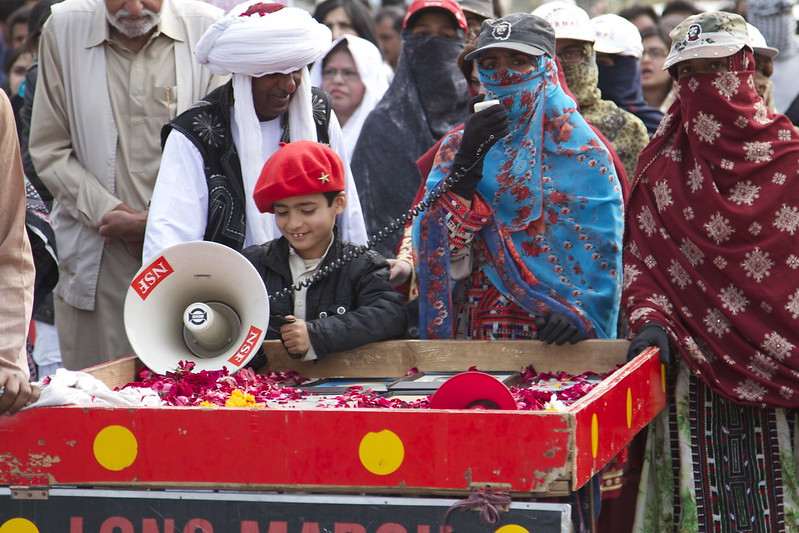
The documents demanded a transparent investigation in enforced disappearances, a UN fact-finding mission to survey the mass graves in Balochistan and an international-standard DNA facility to identify the hundreds of corpses lying in these graves. The officials had assured them that their demands will be met. With a gratified mien, Mama Qadeer said that he was satisfied with the UN response and that he was waiting for the promises to come to fruition.
As soon as he set foot outside the UN embassy, Mama Qadeer was contacted by the embassies of the European Union, United Kingdom, Russia, Norway, China, India and Sweden who aspired to meet with him and analyze his demands. Qadeer prolonged his stay in Islamabad for a few days to meet with the aforesaid officials and then eventually returned to Balochistan.
After a gruelling journey through the parched Balochistan terrain, the marchers ultimately returned to their homeland, waiting for the return of their loved ones. It is unclear whether the UN sent a memorandum to Geneva, but they surely did not fulfil their promises: no investigation was carried out, no mission was sent to Balochistan and no DNA testing facility was provided. After the march, the enforced disappearances continued as usual; kill-and-dump policy fared unhindered. Hundreds of disfigured corpses were – and are – being discovered throughout Balochistan. According to VBMP, the initial 19,000 figure of missing persons has amplified to a whopping 45,000 figure. Students, activists and political workers are arrested solely based on ‘suspicion’ and tried and prosecuted in the military courts without the awareness of their families.
The Chairperson of the Human Rights Commission of Pakistan, Zohra Yousaf, and its General-Secretary, I.A Rehman, lauded the efforts of the VBMP. While maintaining that the issue of Baloch missing persons needs special attention, Yousaf said that: “The issue of missing people is one that despite the attention that the marchers are trying to get, there are continuing cases of disappearances.” She also said that the march was “historical in the context of Pakistan” and that no one has “undertaken this form of peaceful protest before.”
The VBMP long-march of 2013 broke an 84-year-old world record set up by Gandhi. Gandhi had covered a 390-kilometre distance between Ahmedabad and Dandi as a part of his famous Salt march in 1930. Chinese President Mao Zedong’s also carried out a 9000-kilometre long-march from Jiangxi to Shaanxi over 370 days in 1934-35. Mao’s march was technically a military retreat by the Red Army of the Communist Party. The VBMP march is a unique example in world history. Yet after such a cumbersome journey, the marchers only received unfulfilled promises.
Seven years after the march, enforced disappearances have not abated in Balochistan. Through local death squads, overt military might and covert political confinement, the state has detained and confined thousands of Balochs for years. While withdrawing his party’s alliance with the Pakistan’s ruling party, Tehreek Insaaf, Akhtar Mengal cited a similar reason. He said that only 18 people have been recovered since the inception of PTI’s tenure, whereas 500 people have been detained.
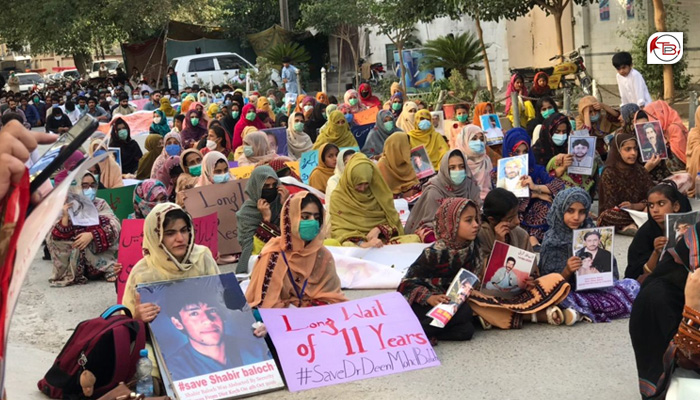
In the end, the 4-month long march was futile. The promises of the UN, EU and other global giants were just promises. Other than a modicum of global attention and scant media coverage, the 2500+ long march did not bear any fruit but it will remain part of Balochistan’s history.
[Continued]


